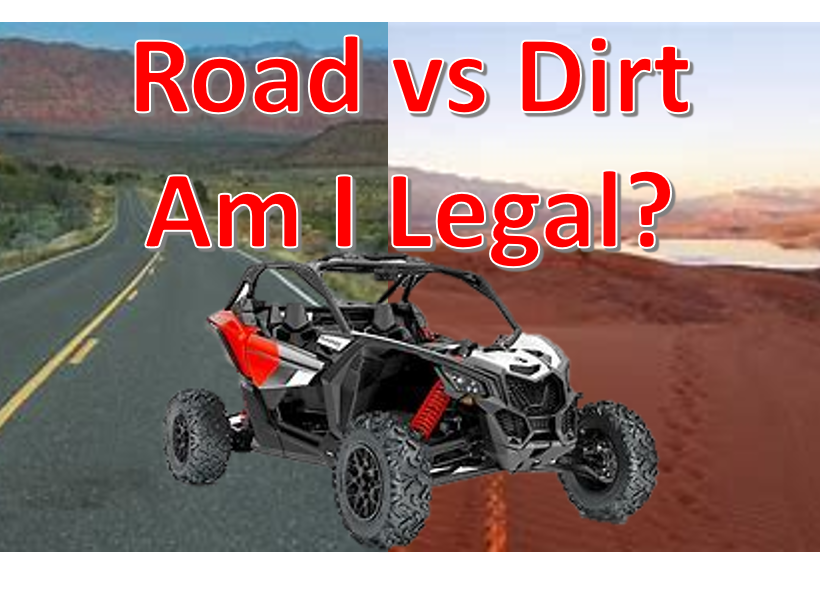
As our state begins to loosen the restrictions associated with the COVID-19 pandemic, Washington County has seen a dramatic increase in outdoor recreation activities. In addition to the increased number of hikers and visitors to our state and local parks, we have seen an increase in the use of recreational vehicles throughout our communities. During recent interactions we have found there was an opportunity to educate the community regarding laws governing the operation of both “Street Legal” and traditional Off-Highway Vehicles (OHVs). Based where and what equipment you are operating, the rules and laws likely vary. It is your responsibility as the operator to know and follow the local regulations. In this article we will attempt to cover some of the most common questions.
Utah law allows for owners to choose to register their ATV’s and side by side UTV’s for traditional off highway use, or as a motor vehicle commonly referred to as “Street Legal.” Traditional OHV registration is displayed with a decal, while “Street Legal” OHV’s are assigned a license plate.
Common questions regarding “Street Legal” OHV’s:
Q: Where can “Street Legal” OHV’s operate in Washington County?
A: All public roads and highways within Washington County are open to “Street Legal” OHV use with two exceptions. They are prohibited on Interstate Freeways (I-15). Federal Rules also prohibit them from operating on the roads inside Zion National Park.
Q: What is the speed limit for a “Street Legal” OHV?
A: “Street Legal” OHV’s are required to operate at the lesser of 50 mph or the posted speed limit. On roads or highways where the limit exceeds 50 mph, they are required to operate to the extreme right edge of the pavement.
Q: Who can operate a “Street Legal” OHV?
A: “Street Legal” indicates the owner has elected to register their OHV as a motor vehicle. Operators are required to have a valid driver’s license to operate on public roads. An OHV Safety Certificate does not qualify an operator to drive on public roads.
Q: Am I required to have insurance on my “Street Legal” OHV?
A: Yes, because it has been designated as a motor vehicle, “Street Legal” OHV’s fall under the Financial Responsibility of Motor Vehicle Owners and Operators Act.
Q: Are helmets required while operating a “Street Legal” OHV?
A: If the vehicle is equipped with a full safety roll cage and seat belts, helmets are not required. However, we still recommend helmet use for all passengers.
Q: Are seat belts required while operating a “Street Legal” OHV?
A: Yes, as a motor vehicle, “Street Legal” OHV’s are also subject to the Traffic Code. This includes seat belts and child restraint laws.
Common questions regarding Off-Highway Vehicle operation.
Q: Can I operate a registered Off-Highway Vehicle on the roadways?
A: This a complicated answer which requires research by the operator. State law prohibits the operation of Off-Highway vehicles on the roads. However, state statute allows local municipalities to enact ordinances allowing the use of OHV’s on the roadway. Ordinances are currently in place for unincorporated Washington County and several cities within Washington County. It is important you contact the local jurisdiction for their OHV laws prior to riding. The ordinances vary widely, limiting which roads you may ride on, for what purpose you may ride on them and in some cases the type of OHV’s allowed.
Q: Who may operate an OHV on public lands with Utah.
A: No persons under the age of eight may operate any OHV on public lands. Individuals over the age of eight must have either a Utah OHV Safety Certificate or valid drivers license. Drivers license status will always super-cede an OHV Safety Certificate. If you driver’s license is suspended, denied or revoked, so is your right to operate an OHV on public lands.
Q: Are helmets required while operating an OHV?
A: All operators and passengers of Type I OHV’s (ATV which has a seat designed to be straddled) under the age of 18 must wear a helmet. Type II OHV’s (Side by side OHV’s) do not require helmets for drivers or passengers so long as they are equipped with full roll cage and properly utilized safety restraint system.
Q: Does a minor child have to be supervised while operating an OHV?
A: According to statute, a minor in possession of a valid OHV Safety Certificate or Driver’s License does not require direct supervision. However, if operating on a roadway open to OHV use, they must be supervised or accompanied by a licensed adult. Utah code defines “direct supervision” as oversight at a distance of no more than 300 feet; within which visual contact is maintained, and advice and assistance can be given and received.
